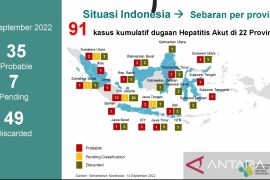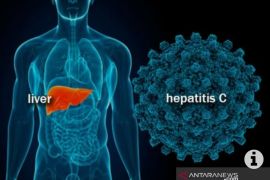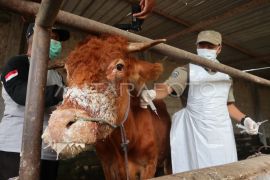Thus, there are many (diseases) and not just hepatitis. This means that (prioritizing certain diseases) in DONs aimed to (instill global awareness) of the initial information and to (foster caution). It does not necessarily mean it will become a worlJakarta (ANTARA) - The mysterious acute hepatitis was not necessarily an epidemic despite the World Health Organization (WHO) deeming it as an outbreak, according to an expert.
Former Director of Infectious Diseases of the World Health Organization (WHO), Prof. Tjandra Yoga Aditama, stated here on Wednesday that acute hepatitis was listed in Disease Outbreak News (DONs) by the WHO on April 15, 2022. Several media outlets stated that WHO perceived it as an outbreak.
Authorities in the US reported that the disease, whose cause was unknown, had infected more than 200 people globally as per May 3, 2022, Aditama remarked.
The mysterious hepatitis was first reported by the United Kingdom on April 15, 2022. It was later included by the WHO on the DONs list.
"We need to know that if there are cases of any unusual disease in the world, they will be included in the Disease Outbreak News (DONs)," he affirmed.
DONs is a routine procedure at the WHO to offer information to the global community about important public health events or those that could likely become important, he stated.
Related news: Returning Eid travelers must maintain health: police
In April 2022, the WHO had listed as many as 10 DONs, he remarked. Those on the list range from mysterious hepatitis that had first been reported in England and Ireland on April 15 and April 23 in various countries; Ebola in Congo; Japanese encephalitis in Australia; Salmoneum thypimurium in various countries; cholera in Malawi; malaria in Somalia; yellow fever in Uganda; VDPV (vaccine derived polio virus) type 3 in Israel; and MERS CoV in Saudi Arabia.
"Thus, there are many (diseases) and not just hepatitis. This means that (prioritizing certain diseases) in DONs aimed to (instill global awareness) of the initial information and to (foster caution). It does not necessarily mean it will become a worldwide epidemic," he remarked.
He stated that the public had been advised to exercise caution, though they did not need to be paranoid. On the other hand, it was necessary for the government to apply precautionary measures as well as for the public to take precautionary acts.
Related news: Surabaya COVID-19 task force intensifies swab tests, vaccinations
"Meanwhile, we will continue to follow the scientific (findings) that will be available in the coming days," Aditama stated.
On a separate occasion, a health expert, who is also the chairperson of the COVID-19 Task Force at the National Medical Association, Prof. Zubairi Djoerban, stated that the latest data showed that there were currently 228 suspected cases of mysterious pediatric hepatitis from 20 countries.
An additional 50 cases were being investigated, and the primary cause was suspected to be Adenovirus 41 (CDC).
Adenovirus is a common virus that causes various diseases, such as cold, fever, sore throat, bronchitis, pneumonia, and diarrhea.
"Adenovirus 41 has never been associated with hepatitis, and this common pathogen is usually resolved by the body itself," he remarked.
Positive results for mysterious hepatitis could only be obtained through detailed tests on blood and not just the plasma analysis, Djoerban stated.
Related news: Health Ministry ups vigilance against mysterious hepatitis in children
Related news: SAR agency readies personnel at tourist attractions in Ternate
Translator: Andi Firdaus, Mecca Yumna
Editor: Fardah Assegaf
Copyright © ANTARA 2022












